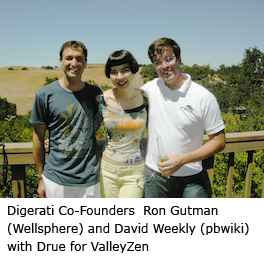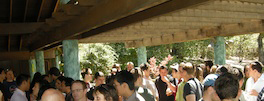Digerati 9 – People You Should Meet
Digerati 9 “sold out” faster than expected and was filled to capacity. The free, but invitation only event formed a wait list quickly earlier this month. On Sunday at the private home of Ron Gutman, techies took in sun and a view from his deck while leisurely sipping champagne and eating mousse. I asked Ron Gutman about the Zen of Digerati. “There is no agenda and we don’t try to frame anything. We don’t tell people what to expect or how to behave. It just happens,” said Ron.

Digerati Co-Founders Ron Gutman (Co-Founder and CEO of Wellsphere) and David Weekly (Founder and Chairman of pbwiki) orchestrate a new mix of people each time and the conversations that bubble up are always of the moment.
Here are some impressions seen and heard from Digerati 9:
1)
Gordon “Fyodor” Lyon was touting his latest book NMAP Network Scanning yesterday before the limited pre-release which will take place at Defcon 16. Lyon’s Nmap Security Scanner has been featured in high profile Hollywood flicks including The Matrix Reloaded, Die Hard 4 and The Bourne Ultimatum. When The Matrix’s Trinity hacks into the powergrid she runs Nmap. What else?
Lyon said giving complex network security functions a consistent and efficient interface is challenging. Taking over 100 command line switches and boiling them down demands simplicity.

2) Ron Gutman says Wellsphere traffic has quadrupled in the last 3.5 months. He attributes the success of the online healthy living community to connecting people in the most granular way —not forcing a “one-solution-fits-all.”
3) Sean Ness, Biz Dev Manager for the Institute for the Future and STIRR Co-Founder told ValleyZen what is going on behind-the-scenes of “The Los Angeles Earthquake: Get Ready.” This multimedia public safety campaign, online game and sourcebook initiative will launch the week of November 12, 2008, in conjunction with The Great Southern California ShakeOut. He hopes the foresight gleaned from the online game portion will motivate people to think about how they will act in a chaotic environment. That could be a Heatwave in Chicago, a Blizzard in Boston, a Tsunami in Tokyo. But of course we start with the California quake!
4) Dr. Daniel Kraft, who meditates when he’s not creating ground-breaking medical devices is the Founder of StemCor Systems. He was abuzz about getting FDA Clearance for the MarrowMiner. Kraft is a doctor at Stanford’s Institute for Stem Cell Biology & Regenerative Medicene. Kraft says he is now “getting into the venture thing” as a Venture Partner at Proteus. He digs ValleyZen and told us that he first meditated as a Stanford med student in Nepal.
5) Khris Loux, CEO and co-founder of JS-Kit, talked about a future filled with lightweight “portable” widgets. In his mind, portability means that various sources (be it different users reviewing a given product, or various comments from a single user) will be aggregated through one single, shared widget. (Of course, such a vision is predicated on the assumptions that (1) the user will want such aggregation and (2) that the aggregators will establish their own brand recognition as unbiased information brokers so as to avoid cheating/distortions). Kris believes in the importance of giving his users the ability to opt-in and opt-out. He says JS-Kit is perhaps the only such service that gives a user the freedom to download their info and leave.
6) Sanford Barr Co-Founder STIRR spoke sotto voce about his new startup SocialDynamics which he says “deals with pain he’s suffered before.” That’s all we can say!
7) Lorenzo Thione, Powerset Co-Founder and Product Architect and Franco Salvetti, Natural Language Scientist sipped Mimosas and waxed poetic about Powerset’s recent acquisition by Microsoft. “I was eating a mini Kobe Burger on 57th street in New York when I received the news—-surreal,” said Salvetti.
-Drue Kataoka



Jonah Lerher’s article about the nature of insight in the current New Yorker provides a perfect frame for what you’re describing here, Drue. He’d argue that insight comes best when we are generally relaxed and not tightly focused — exactly what happens at an intellectually stimulating but not process/result driven experience like you describe. (This is of course the magic of TED — at least the old, smaller TED). Thanks for the report.